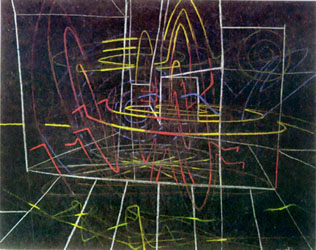Catalogue
Each of the essays in the catalogue will challenge accepted perceptions of artists of Latin American origin and the reception of their work. Mary Schneider Enriquez will examine Matta’s role as an artist of international influence–one of the first from Latin America to achieve a leadership role in the world’s art circles. The scope of Matta’s work will be analyzed with particular attention to the critical place he created for himself within Andre Breton’s Surrealist circle, with Marcel Duchamp, and amongst the early protagonists of the Abstract Expressionist Movement in New York. Enriquez will illustrate Matta’s success throughout the course of his lifetime and throughout the international art scene as an unusual talent whose distinctive works achieved unflagging respect. Sarah Beckjord will focus on the critical reception of Roberto Matta as an ambiguous figure, one who, though Chilean by birth, was more often associated with artistic circles in New York and Paris than with avant-garde movements in Latin America. Elizabeth Goizueta will explore the symbiotic relationship between Matta and several Spanish and Latin American literary figures with whom he had close personal ties. She will further argue that although Matta lived an itinerant life, with significant time spent in three continents, he was, nonetheless, influenced above all by the Latin American cultures and that these contributed to an overwhelmingly Latino perspective in his art. Roberto Goizueta will argue that Matta’s lifelong struggle to "make the invisible visible" suggests a fundamentally Ignatian, Catholic–and, specifically, Latin American Catholic–impulse. Claude Cernuschi will investigate how Matta's key ambition to represent and evoke the human psyche in visual form was filtered through the writings of Freud and the psychoanalytic view of the mind as a three-dimensional space: the "inscape". Cernuschi will also outline the interpretive assumptions that allowed Matta to solve the problem of representing an immaterial entity like the psyche on canvas.

Untitled, 1944. Wax crayon and lead pencil on paper,
9 3/4 x 12 in.Haim Chanin Fine Arts, NYC
Author Biographies
Sarah H. Beckjord is Assistant Professor of Romance Languages at Boston College and teaches courses on Latin American Literature and Culture, with an emphasis on the colonial period and nineteenth century. She is particularly interested in the cross-fertilization of aesthetic and ideological trends between Latin America and Europe and has published articles on anti-slavery narratives in Cuba and on the chronicles of the Conquest of Mexico. Current work-in-progress includes a book on the writing of the history of the New World.
Claude Cernuschi received his M.A. and Ph.D degrees from the Institute of Fine Arts, New York University. He has taught at Hunter College, New York University, Duke University, and is presently associate professor of the history of modern art at Boston College. He is the author of Jackson Pollock: Meaning and Significance (1992), Jackson Pollock: "Psychoanalytic" Drawings (1992), "Not an Illustration but the Equivalent": A Cognitive Approach to Abstract Expressionism (1997) and Re/Casting Kokoschka: Ethics and Aesthetics, Epistemology and Politics in Fin-de-Siecle Vienna (2002). He is also a contributor to the catalogs Re/Dressing Cathleen: Contemporary Works from Irish Women Artists (1997) Edvard Munch: Psyche, Symbol, and Expression (2001), and Oskar Kokoschka: Early Portraits from Vienna and Berlin (2002).
Mary Schneider Enriquez is an Independent Curator and Art Critic who specializes in Modern and Contemporary Latin American Art. She earned both her B.A. and M.A. degrees in art history at Harvard University. Enriquez serves as Latin American Art Consultant for the Harvard University Art Museums and the David Rockefeller Center for Latin American Studies at Harvard. In 2000-01 she co-curated the exhibition "Geometric Abstraction: Latin American Art from the Patricia Phelps de Cisneros Collection" at the Harvard Art Museums. She curated a traveling retrospective of contemporary Mexican multi-media artist Gerardo Suter and in 1994-5, she co-curated the exhibition "Mexico: A Landscape Revisited" with the Smithsonian Traveling Exhibition Service that toured five museums within the U.S. and Mexico. Enriquez has served as the Latin American Correspondent for ARTnews Magazine, contributed reviews to Art In America Magazine, and has written criticism for Art Nexus Magazine. She has written numerous essays for museum and gallery exhibition catalogues.
Elizabeth T. Goizueta Elizabeth T. Goizueta has a B.A. in Spanish and Economics and an M.A. in Spanish Linguistics from the University of Georgia. She received a scholarship to the University of Salamanca, where she undertook additional graduate studies. Upon returning to the United States, Goizueta was certified to work in Immigration Law, becoming the Co-Director of the Amnesty program of Catholic Social Services in Atlanta. Since 1993, Goizueta has taught at Loyola University in Chicago and Boston College. She has collaborated on numerous academic projects and is currently teaching a special section of “Naturalmente,” a course for students interested in exploring Hispanic literature through Latin American contexts of immigration and politics.
Roberto S. Goizueta is Professor of Theology at Boston College. He is President Elect of the Catholic Theological Society of America and a past President of the Academy of Catholic Hispanic Theologians of the United States. Dr. Goizueta received his B.A. from Yale University, his M.A. and Ph.D. from Marquette University, and a Doctor of Humane Letters, honoris causa, from the University of San Francisco. The National Catholic Reporter has named him one of the ten most influential Hispanic American educators, pastors, and theologians. His book Caminemos con Jesús: Toward a Hispanic/Latino Theology of Accompaniment received a Catholic Press Association Book Award.

